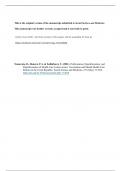This is the original version of the manuscript submitted to Social Science and Me dicine . This manuscript was further revised, accepted and is currently in print. Until 6 June 2021, the final version of the paper will be available for free at https://authors.elsevier.com/a/1cwg --CmUs0Zp Numerato, D., Honová, P .A. & Sedláčková, T. ( 2021 ). Politicisation, Depoliticisation, and Repoliticisation of Health Care Controversies: Vaccination and Mental Health Ca re Reform in the Czech Republic. Social Science and Medicine , 277 (May): 113916 https://doi.org/10.1016/j.socscimed.2021.113916 Politicisation, Depoliticisation, and Repoliticisation of Health Care Contr oversies: Vaccination and Mental Health Care Reform in the Czech Republic Dino Numerato, PhD ( Corresponding Author) Department of Sociology, Faculty of Social Sciences, Charles University Prague dino.numerato@fsv.cuni.cz ORCID: 0000-0002-4821-6471 Petra A. Honová, MA Department of Sociology, Faculty of Social Sciences, Charles University Prague petra.honova@fsv.cuni.cz ORCID: 0000-0002-2910-954X Tereza Sedláčková, MA Department of Sociology, Faculty of S ocial Sciences, Charles University Prague tereza.sedlackova@fsv.cuni.cz ORCID: 0000-0002-3501-6964 Title: Politicisation, Depolitici sation, and R epoliticisation of Health Care Controversies: Vaccination and Mental Health Care Reform in the Czech Republic Abstract : This article analyse s the politicisation of public health debates . By empirically focusing on the cases of vaccination and mental health care in the Czech Republic , we elaborate upon and apply an interpretative framework to analyse politicisation processes. Politicisation commonly refers to the political instrumentalisa tion of health care controversies as part of electoral campaigning and power struggles. By focusing on the role of civic engagem ent and the involvement of patients in these processes, we view politicisation as a broader process which encompasses a plurality of political behaviours and includes patients, users, carers , citizens , and experts . Our analysis draws on extensive empirical evidence, consisting of observations, semi-structured interviews, and a review of available documents. The study took place in the Czech Republic from 2017 to 20 19. We conclude that politicisation takes place alongside four dimensions: (1) contingency, (2) agency, (3) a plurality of opinions and approaches, and (4) visibility. We further argue that the contingent nature of biomedical controversies is articulated in three different, possibly interconnected layers. Thus, a ny politicisation refers to (a) uncertainties and problematic aspects of biomedical objects of controversy; to (b) social rights, economic needs, and legal aspects as well as social representations of illness and vaccinations in the public debate ; and to (c) the political processes which determine the previous two layers of politicisation, labelled as meta -polit icisation. Last but not least, we stress the dynamic and non -linear nature of politicisation processes and the necessity to analyse the politicisation of public health controversies hand in hand with its connection to depoliticisation and repoliticisation. Keywords : civic engagement, depoliticisation, mental health reform, meta -politicisation , politicisation, repoliticisation, vaccination Wordcount : 8897 Introduction We are not vaccination experts [...]. We should respect the authorities in the Czech Republic, such as the president of the Vaccinology Society and the people focused on immunisation and allergology. These people have a particular opinion which we respect, and, basically, we should do [...] some self-reflection, have the humility to not develop these topics. Yes, it is . It is clear that this is a political question . This paper purposively starts with two quotations we collected as part of our study on the politicisation of health care in the Czech Republic. The first statement was uttered during a parliamentary debate about vaccination by a Czech member of parliament who is , at the same time, a paediatrician (Parliamentary Meeting Minutes, March 2015) . The second claim appeared in a documentary about vaccination and was pronounced by a Czech politician who contested the political silence over some vaccination -related decisions in the country (Reichová, 2017). These two quotations , made by actors involved in public debates about vaccination , well-
illustrate the symbolic struggles over the role of biomedical expertise in contemp orary societies. While the first quote represents the position of expertise as a politically untouchable black -box, the second quote exposes the topic of vaccination to critical public scrutiny. Between these two radically opposing positions, it is above all the latter claim which mirrors the engagement of citizens concerning health care topics. The standpoint expressed in the first quote would call for depoliticisation, for silence among non- expert s when it comes to discussion of medical matters. The second quote refers to the problematisation of the traditionally recognised authority of expert knowledge by laypersons and to the fact that the




